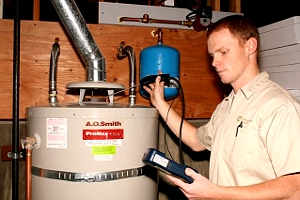 A technician checks the combustion efficiency and safety of a water heater—an important part of any home energy audit.
A technician checks the combustion efficiency and safety of a water heater—an important part of any home energy audit.
I hope I’m certifiable. I’ll find out in about a year when I’ve completed all the training and taken the written and field exams to become a Building Performance Institute (BPI) certified Building Analyst. The certification would allow me to perform energy audits on homes and maybe even get paid for it if I started an auditing business or joined an existing company. The certification would not prepare me to perform energy upgrade measures, such as air sealing and insulating an attic, only recommend the most cost effective ones. Many energy auditors work with a team of trusted contractors who can do the work the homeowner chooses.
My publisher Tom White and I decided that going through the kind of training that we have been pushing in our magazine will give me a more realistic view of the home performance industry, and the people who are just entering it now—the new weatherization workers, and newly minted technicians, contractors, and small business owners who will help build the new green economy. And it’s an excuse to get off my butt and out of the office more often. If I get certified, I’ll need to continue taking classes and have hands-on experience in the field to stay certified.
There are three kinds of certifications for a wannabe energy auditor to consider: certification as a Building Analyst through BPI; certification as a HERS (Home Energy Rating System) rater through the Residential Energy Services Network; or one of many “green builder” certifications that exist nationwide. I think the Building Analyst is the most basic. The training follows closely that of a HERS rater, but HERS raters need to become expert at rating software; it’s a bit more involved. I thought about being certified through Build It Green California as a Green Building Professional. But once I’m certified through BPI, I think it would be a small step to being certified by the other organizations.
Now I am asking what many people in the midst of career decisions are asking. Where do I go for the training and how much will it cost? BPI is in Malta, New York. (Might as well be Malta, the country.) Fortunately, BPI has hundreds of affiliates and approved trainers all over the country. There is also online training, and trainers who will travel to your hometown, as long as you have several people interested in the training. My plan so far is to complete an online training course through well-respected training organization, Saturn Online. That will prepare me for the Building Analyst written exam. I can even take the exam online. The course costs $595, plus about $70 for a book and field manual. Once you start the online course, you have about 8 weeks to complete it, so I can study and take the quizzes and final exam in my spare time—maybe over the holidays. The written exam fee is $225.
